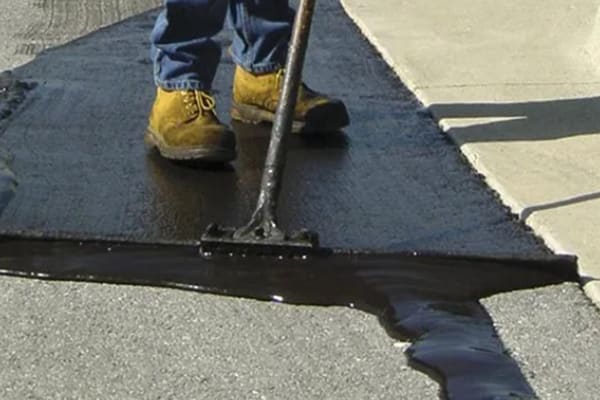Coal tar asphalt, often referred to as coal tar pitch, is a black, sticky, and highly viscous substance derived from the distillation of coal tar. Coal tar itself is a byproduct of coal processing, particularly during the production of coke and coal gas. While many associate asphalt with petroleum products, coal tar asphalt has distinct properties and applications that set it apart. Used mainly in paving and roofing, this material has been a key element in industrial processes for over a century. Below, we explore the nature of coal tar asphalt, its production process, and the various industries in which it is used.
1. How is Coal Tar Asphalt Made?
Coal tar asphalt is produced by distilling coal tar, a thick, dark liquid generated as a byproduct in coal processing, typically from coking operations in steel manufacturing. The process involves heating coal tar to remove volatile components, leaving behind a dense and sticky residue called coal tar pitch, which forms the basis of coal tar asphalt.
The distillation process also yields various other byproducts, such as creosote and oils, but coal tar pitch is the most important component for creating asphalt-like materials. This refined product is then further processed and sometimes mixed with other ingredients to enhance its properties, making it suitable for specific applications, such as paving, waterproofing, and sealing.
2. Key Properties of Coal Tar Asphalt
Coal tar asphalt has several unique characteristics that make it highly valuable in various industrial applications:
- Water resistance: One of coal tar asphalt’s most significant properties is its exceptional resistance to water and moisture. This makes it ideal for applications where waterproofing and durability against weather conditions are crucial.
- Chemical resistance: Coal tar asphalt is highly resistant to a wide range of chemicals, including oils, solvents, and acids. This property is particularly beneficial in environments where exposure to harsh chemicals is common, such as industrial floors or areas where petroleum products are stored.
- Durability: Due to its composition, coal tar asphalt provides a long-lasting, durable surface that can withstand heavy use and extreme environmental conditions, including high temperatures and UV radiation.
- Adhesion: Coal tar asphalt offers excellent adhesion to various surfaces, including concrete, metal, and other paving materials. This makes it useful as a binding agent for roadways and roofing systems.
3. Applications of Coal Tar Asphalt
Coal tar asphalt has a wide range of applications, with its durability, chemical resistance, and water resistance making it indispensable in several industries:
Paving and Road Construction
Coal tar asphalt is widely used in the paving industry, especially for surfaces that are exposed to harsh conditions, such as airport runways, industrial sites, and heavily trafficked roads. While petroleum-based asphalt is more common in modern road construction, coal tar asphalt is still preferred in situations where the surface is exposed to petroleum products, chemicals, or solvents.
One notable use of coal tar asphalt is in airport runway paving, where its resistance to jet fuel and other aviation-related chemicals makes it a superior option compared to standard asphalt. Additionally, coal tar-based sealants are frequently applied to asphalt roads and parking lots to protect against cracking, water infiltration, and chemical damage.
Roofing Materials
Coal tar asphalt has long been used in the production of roofing materials, particularly in flat or low-sloped roofs. In these applications, coal tar pitch serves as a waterproofing agent and is often combined with layers of felt or fabric to create a durable, leak-proof membrane. This method, known as built-up roofing (BUR), has been a popular roofing system for decades.
Its water resistance and ability to adhere to various materials make it an excellent choice for commercial roofing systems, particularly in environments that face severe weather or temperature fluctuations.
Waterproofing and Sealants
Coal tar asphalt is also used as a waterproofing agent for foundations, basements, and other below-ground structures. Its ability to form a protective barrier against moisture makes it ideal for areas prone to water infiltration. Additionally, it’s used as a protective coating for pipelines, storage tanks, and other infrastructure exposed to moisture or corrosive environments.
Industrial and Chemical Flooring
In environments where floors are exposed to chemicals, oils, or solvents, coal tar asphalt plays a vital role as a protective surface. Its chemical resistance makes it perfect for industrial flooring in factories, warehouses, and chemical processing plants, ensuring that the floors can withstand exposure to harsh substances over long periods without degradation.
4. Health and Environmental Considerations
While coal tar asphalt has several advantageous properties, its use has come under scrutiny due to potential health and environmental risks. Coal tar contains polycyclic aromatic hydrocarbons (PAHs), which are known to be harmful and possibly carcinogenic. Prolonged exposure to PAHs, particularly in the form of coal tar-based sealants, has raised concerns about the health risks to workers and the environment.
In response, some jurisdictions have restricted or banned the use of coal tar-based products, especially in residential areas and where direct human contact is frequent. Alternatives such as petroleum-based asphalt or eco-friendly sealants are often promoted as safer options, especially in non-industrial settings.
Conclusion
Coal tar asphalt is a versatile and durable material with a wide range of applications in industries such as paving, roofing, waterproofing, and industrial flooring. Its chemical resistance, water resistance, and long-lasting performance make it a valuable choice for surfaces exposed to harsh conditions. However, due to health and environmental concerns related to PAHs, the use of coal tar asphalt is becoming more restricted, and safer alternatives are being sought in certain applications. Despite this, coal tar asphalt remains a critical material in many industrial processes, especially where its unique properties are irreplaceable.
Post time: 09-19-2024






